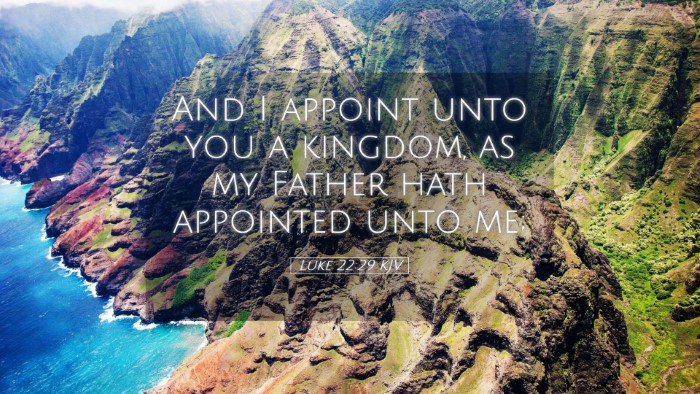Commentary on Luke 22:29
Verse Context: Luke 22:29 states, "And I appoint unto you a kingdom, as my Father hath appointed unto me." This profound declaration is made during the Last Supper, a time when Jesus is preparing His disciples for the trials that lie ahead, including His impending crucifixion.
General Overview
This verse emphasizes the theme of divine appointment and the nature of the Kingdom that Jesus is establishing. The appointment refers to both the authority Jesus is conferring upon His disciples and the reassurance of their future role in God’s plan.
Theological Significance
The theological implications of Jesus' words are multifaceted:
- Divine Authority: The phrase "I appoint unto you" signifies a transfer of authority that emanates from Jesus, who is the ultimate authority under the Father.
- The Kingdom's Nature: The "kingdom" here signifies not just a future reign but an active participation in God’s redemptive work through the gospel.
- Inclusivity: Jesus' statement implies an extension of His mission to His followers, indicating that they are co-laborers in the ministry of the Kingdom.
Insights from Commentaries
Matthew Henry's Commentary
Henry emphasizes that the appointment of the kingdom is a significant honor to the apostles. He notes that Jesus foresees their roles in the Church and their gathering of believers. Further, Henry highlights that this appointment is not merely earthly but has eternal implications. He states that the disciples would sit on thrones judging the twelve tribes of Israel, which signifies a high calling and responsibility to lead and shepherd others.
Albert Barnes' Notes on the Bible
Barnes elaborates on the concept of being "appointed" to the kingdom. He interprets this as Jesus ensuring that His disciples will partake in the benefits of the Gospel and the future exaltation of believers. He points out that this appointment is indicative of their co-regency with Christ, a promise that extends beyond their earthly ministry to an eternal kingship. Additionally, Barnes discusses the implications of Jesus sharing His authority, expressing that it reflects God's generosity in bestowing roles within His divine plan.
Adam Clarke's Commentary
Clarke provides an analysis focusing on the assurance that this appointment grants to the disciples. He underscores that the disciples are being equipped for leadership roles that will be critical in the establishment of the early Church. Clarke also raises the importance of the conditions tied to this appointment, warning that those who would reign must first be willing to serve, thus connecting the concept of leadership with humility and servant-heartedness. Clarke implies that this serves as a foundation for the understanding of Christian leadership throughout the ages.
Application for Pastors and Theologians
This scripture calls for reflection on the nature of pastoral leadership in the context of servanthood. Here are some key applications:
- Servant Leadership: Pastors are reminded that their authority is derived from Christ and must be exercised in a spirit of humility and service.
- Embracing Kingdom Responsibility: The call to the ministry is both a privilege and a responsibility, urging church leaders to approach their role with reverence and diligence.
- Equipping Others: As Christ appointed His disciples, leaders are tasked with mentoring and empowering the next generation of believers for ministry.
Conclusion
Luke 22:29 is a crucial scripture that speaks to the nature of leadership in the Kingdom of God. The insights drawn from able commentators provide a rich tapestry of understanding that enriches theological discourse. As members of Christ's body, both pastors and theologians are called to recognize their significance in God's Kingdom, exercising their roles with humility, integrity, and a commitment to service.


